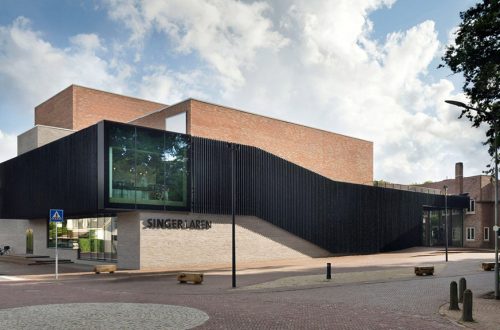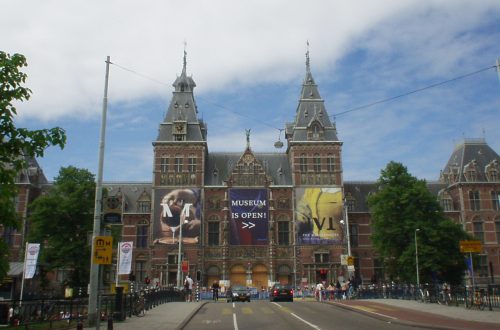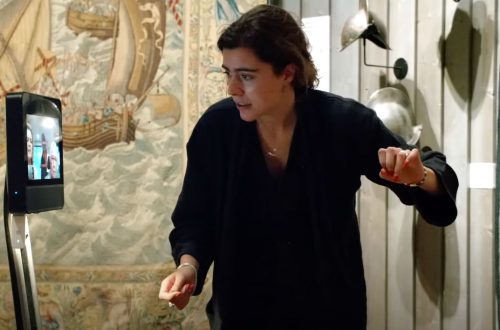
Land Art Weekend 2020 (Flevopolder, the Netherlands)
The limitations of the corona pandemic urged Landscape Art Flevoland to develop a more individual form of the Land Art Weekend, a festival that annually highlights nine land artworks in the province of Flevoland, the Netherlands. In order to organize the Land Art Weekend in 2020, Land art Flevoland developed a series of ten educational podcasts and nine atmospheric playlists to enable individual visits to the artworks. As the Land Art Weekend was one of the few art productions accessible to audiences in the summer of 2020, it received a generous amount of coverage in the local and national media. The program was broadcasted in the Land Art Weekend during the weekend of 6 and 7 June 2020 and has been made available on several media platforms since.
The land Art Flevoland foundation, a small team of three employees, proved to be adaptable and decisive during the corona crisis. They sought constructive collaborations in order to timely produce the program for the 2020 edition of the festival. The two associated funds were reported to be flexible and collaborative. The online solutions gave the visitors freedom and space but stood in the way of systematic visitor analysis. Anecdotal reactions suggested that visitors were somewhat younger than usual, and also a higher number of visitors were relatively new to visiting art.
Background
Land art in the province of Flevoland
The Land art Flevoland foundation discloses the largest coherent collection of land art in the world. It consists of nine extensive landscape artworks, all located in the polder of Flevoland (a spatial and relatively new province of the Netherlands that was drained in 1955). The works are created by different artists who used landscape structures, combined with artificial elements and even sound. They are embedded in a fluctuating natural and cultural environment. The land art works are outside, and as they lack an institutional environment, they are culturally accessible. On the other hand, because of their situation, personal or local transport and some physical mobility are prerequisites to visiting.
Land Art Flevoland
Land Art Flevoland is a foundation that emerged from Museum De Paviljoens, and is planned to be integrated into a future art museum in the Flevo polder. It aims for expanding the land art collection and presenting it in a poetic and accessible way, aiming at all audiences in principle. In order to do so, tours, lectures, and the yearly Land Art Weekend are organized. The latter is a festival of lectures, exhibits, and guided tours centered around the art works. During the past Land Art Weekend festivals, the landscape works have also served as background for artistic (theatre) performances. In the corona period, however, Land art Flevoland has evaluated this approach and renewed its focus on the autonomic artistic nature of the works, accentuating the emotional experience of the landscape art by visitors, as well as its preservation.
Organization, funding and partners
Land Art Flevoland consists of three employees, Martine van Kampen (curator), Tessa Haan (project manager), and Sophia Zürcher (communication). The organization is structurally sponsored by the province of Flevoland and receives additional funding of €40.000 for the Land Art Weekend festival by the VSBfonds and the Prins Bernhard Cultuurfonds. Land Art Flevoland primarily partners with the province of Flevoland as well as the current owners of the land art works: the Flevo-landschap, the municipalities of Almere, Lelystad, Zeewolde, Noordoostpolder, Dronten; Staatsbosbeheer (Forestry Commission) and Natuurmonumenten (Nature Monuments). Land Art Flevoland has a board of three voluntary members. For the Land Art Weekend 2020, the foundation collaborated with art journalist Luuk Heezen, who contributed to the creation and broadcasting of the podcast, and ‘social designer’ Vesna Dragojevic and education bureau Good4Good who compiled the playlists. The live shows were broadcasted from the center for art and culture De Verbeelding in Zeewolde.
Description
Aiming at individual experience of land artworks
In order to find a coronaproof way to proceed with the Land Art Weekend 2020, Land Art Flevoland developed series of audio that celebrate the local land artworks and deepen its experience by the visiting audiences. All nine artworks were accompanied by a podcast and a separate playlist that could (and still can) be downloaded through various audio platforms – as well as the Land Art Flevoland website. The idea was to safely offer these extra layers for individual visitors or small (household) groups, but also to use the program on future occasions. The podcasts educate and connect to the individual artwork from different perspectives, while the playlists offer a more intuitive, poetic experience.
Podcasts, playlists
The podcasts were created by art journalist Luuk Heezen and produced as live broadcasts. During the Land Art Weekend, in five shows a day, the individual artworks were highlighted upon by guest lecturers. Between the shows, visitors could drive to the next artwork and listen to the shows – live and at the actual location. The program was broadcast from the center for art and culture De Verbeelding in Zeewolde. Next to the series of live shows, a range of playlists were created by Vesna Dragojevic. Each playlist connected to one of the artworks, aiming at intimate and atmospheric interpretations of the individual works.
Funding and organization
Martine van Kampen, curator at Land Art Flevoland, reports that the creation, organization, and funding of the 2020 edition of the festival went smoothly, the two big funds, the VSBfonds and the Prins Berhard cultuurfonds allowed for the alternative program with the original funding of €40.000 in total. Therefore, this budget was maintained and no extra costs were made. It appears that the small and decisive team had been fast in its ideas and decisions. Martine mentions that it had been an advantage that the affiliated media producers had few other assignments at the time, and could easily make time for the Land Art Weekend project.
Impact
Covid-19
Land Art Flevoland experimented with alternative media for spreading audiences, shifting from the live and shared festival form to a more individualistic and more contemplative way of experiencing the collection. In this way, the Land Art Weekend can also be adaptive to regulations and restrictions as they may occur – perhaps last minute. The organization expects that Covid-19 will remain a force to reckon with in the years to come, so they are happy with this experience and decided to (also) stick to this way of working in the time to come.
Artworks as the focal point
Although the 2020 edition of the Land Art Weekend ran smoothly, successfully, and within the original budget, it did make the organization rethink its aims and goals. The earlier editions of the festival had been a mix of education, poetic interpretations, and performance, at which the artworks sometimes served as stage sets rather than autonomous centerpiece. The audio program of 2020 all departed from the works of art in their own right, renewing the foundation’s artistic angle on the collection. This concentration on the art itself meets with the plans for conservation and documentation of the collection – as media such as podcasts could also be used to document the artists’ concepts and intentions of the landscape works.
Audiences
In this case, it is hard to define the impact on audiences. In normal editions of the Land Art Weekend, guides on location count the visitors, but additional data is never collected. In the 2020 issue, people could visit the artworks where and when they wanted, making it nearly impossible to get a grip on visitor numbers, demographics, and identities. The visitors that took part in the live broadcasts during the weekend were counted as usual and resulted in 1051 visits, where 750 had been estimated. From these observations and incidental reactions, the organization concludes that participants were younger than usual and that they may have included a ‘new’ group that usually does not visit art festivals or museums. Future editions will have to point out if this was a Covid-incident or a new trend.
Media coverage
During the pandemic, museums were closed and big public art festivals ruled out. The Land Art Weekend was one of the very few ways to experience art, as its manifestation was so similar to nature recreation, and could be done in very small groups. Local and national media paid attention to the alternative program. Curator Martine van Kampen was interviewed by several local radio and television stations (Opium Radio, Omroep Flevoland and OZONOP (a radiostation for the elderly in the Noordoostpolder), and national media, such as Het Financieele Dagblad payed attention to land art and the festival, The big national broadcasting station AVROTROS dedicated editions of Nu te zien en Koffietijd to the festival.
Author
References
- Land Art Weekend 2020.
- Fotoverslag Land Art Weekend 2020.
- Kunst in de Flevopolder. 5 juni 2020. Het financieele dagblad.
- Museumtijdschrift. June 2019.
- Mariska van den Berg en Martine van Kampen e.a. Land Art Live. nai010 uitgevers, Rotterdam.
Contact: Martine van Kampen (curator)




